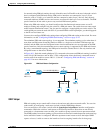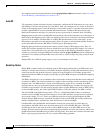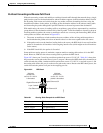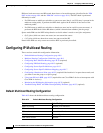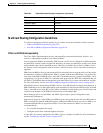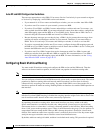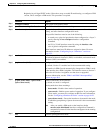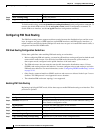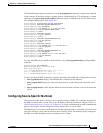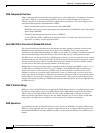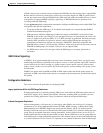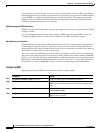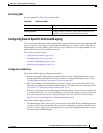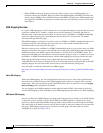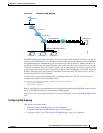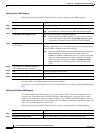
40-13
Cisco ME 3400 Ethernet Access Switch Software Configuration Guide
OL-9639-06
Chapter 40 Configuring IP Multicast Routing
Configuring IP Multicast Routing
To disable PIM stub routing on an interface, use the no ip pim passive interface configuration command.
In this example, IP multicast routing is enabled, Switch A PIM uplink port 25 is configured as a routed
uplink port with spare-dense-mode enabled. PIM stub routing is enabled on the VLAN 100 interfaces
and on Gigabit Ethernet port
20 in Figure 40-1:
Switch(config)# ip multicast-routing distributed
Switch(config)# interface GigabitEthernet0/25
Switch(config-if)# no switchport
Switch(config-if)# ip address 3.1.1.2 255.255.255.0
Switch(config-if)# ip pim sparse-dense-mode
Switch(config-if)# exit
Switch(config)# interface vlan100
Switch(config-if)# ip pim passive
Switch(config-if)# exit
Switch(config)# interface GigabitEthernet0/20
Switch(config-if)# ip pim passive
Switch(config-if)# exit
Switch(config)# interface vlan100
Switch(config-if)# ip address 100.1.1.1 255.255.255.0
Switch(config-if)# ip pim passive
Switch(config-if)# exit
Switch(config)# interface GigabitEthernet0/20
Switch(config-if)# no switchport
Switch(config-if)# ip address 10.1.1.1 255.255.255.0
Switch(config-if)# ip pim passive
Switch(config-if)# end
To verify that PIM stub is enabled for each interface, use the show ip pim interface privileged EXEC
command:
Switch# show ip pim interface
Address Interface Ver/ Nbr Query DR DR
Mode Count Intvl Prior
3.1.1.2 GigabitEthernet0/25 v2/SD 1 30 1 3.1.1.2
100.1.1.1 Vlan100 v2/P 0 30 1 100.1.1.1
10.1.1.1 GigabitEthernet0/20 v2/P 0 30 1 10.1.1.1
Use these privileged EXEC commands to display information about PIM stub configuration and status:
• show ip pim interface displays the PIM stub that is enabled on each interface.
• show ip igmp detail displays the interested clients that have joined the specific multicast source
group.
• show ip igmp mroute verifies that the multicast stream forwards from the source to the interested
clients.
Configuring Source-Specific Multicast
This section describes how to configure source-specific multicast (SSM). For a complete description of
the SSM commands in this section, refer to the “IP Multicast Routing Commands” chapter of the Cisco
IOS IP Command Reference, Volume 3 of 3: Multicast. To locate documentation for other commands that
appear in this chapter, use the command reference master index, or search online.
The SSM feature is an extension of IP multicast in which datagram traffic is forwarded to receivers from
only those multicast sources that the receivers have explicitly joined. For multicast groups configured
for SSM, only SSM distribution trees (no shared trees) are created.



